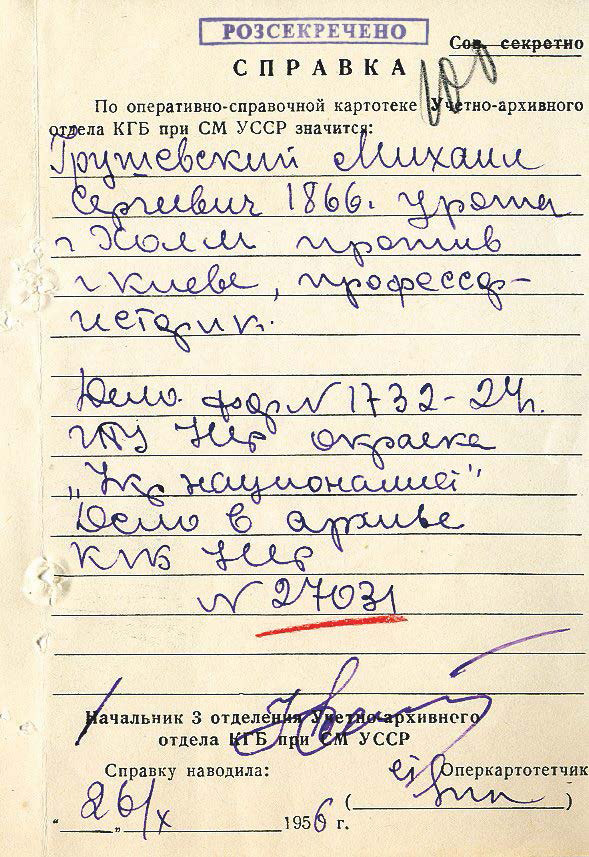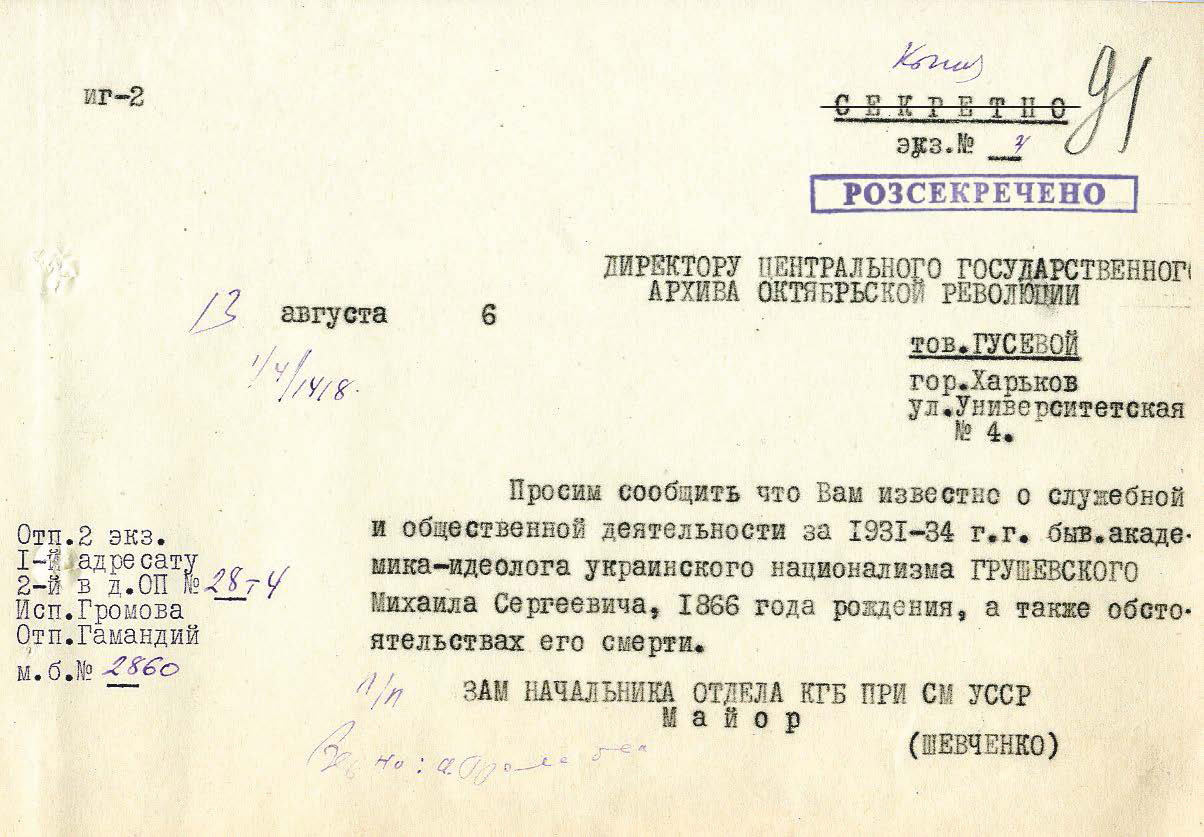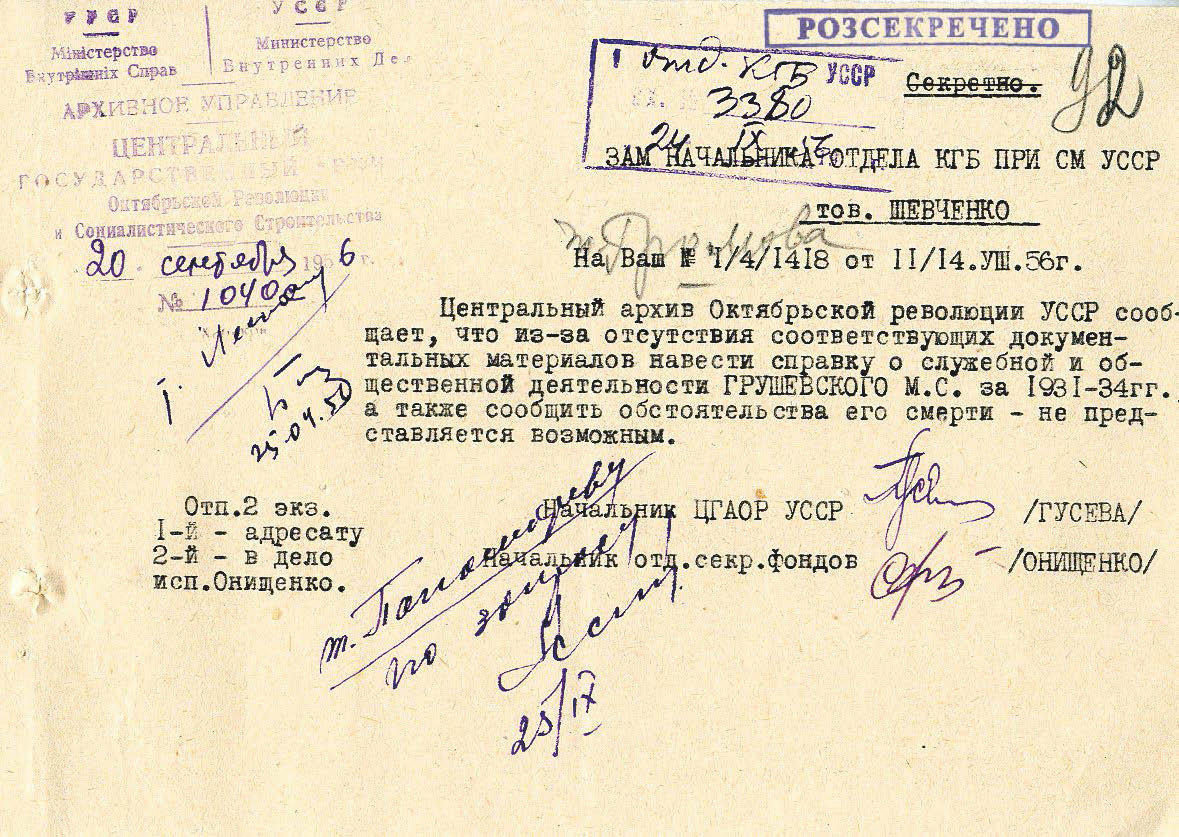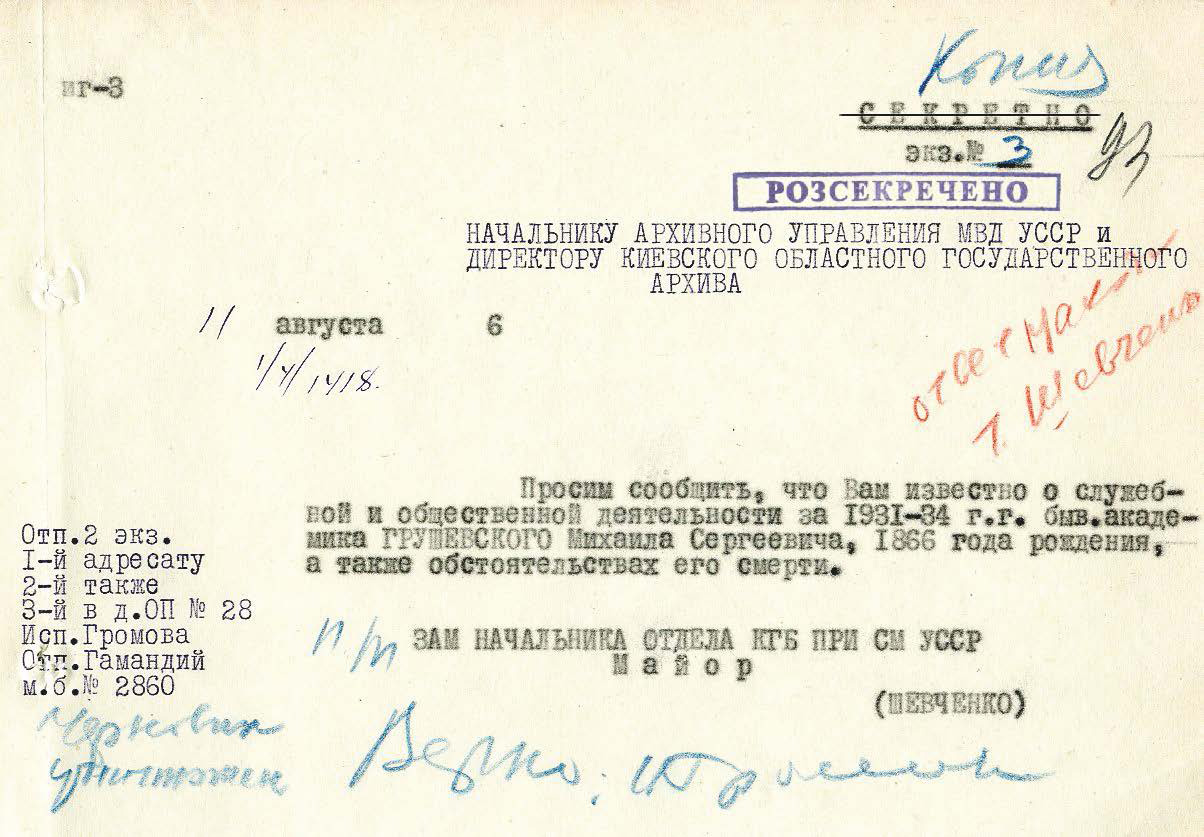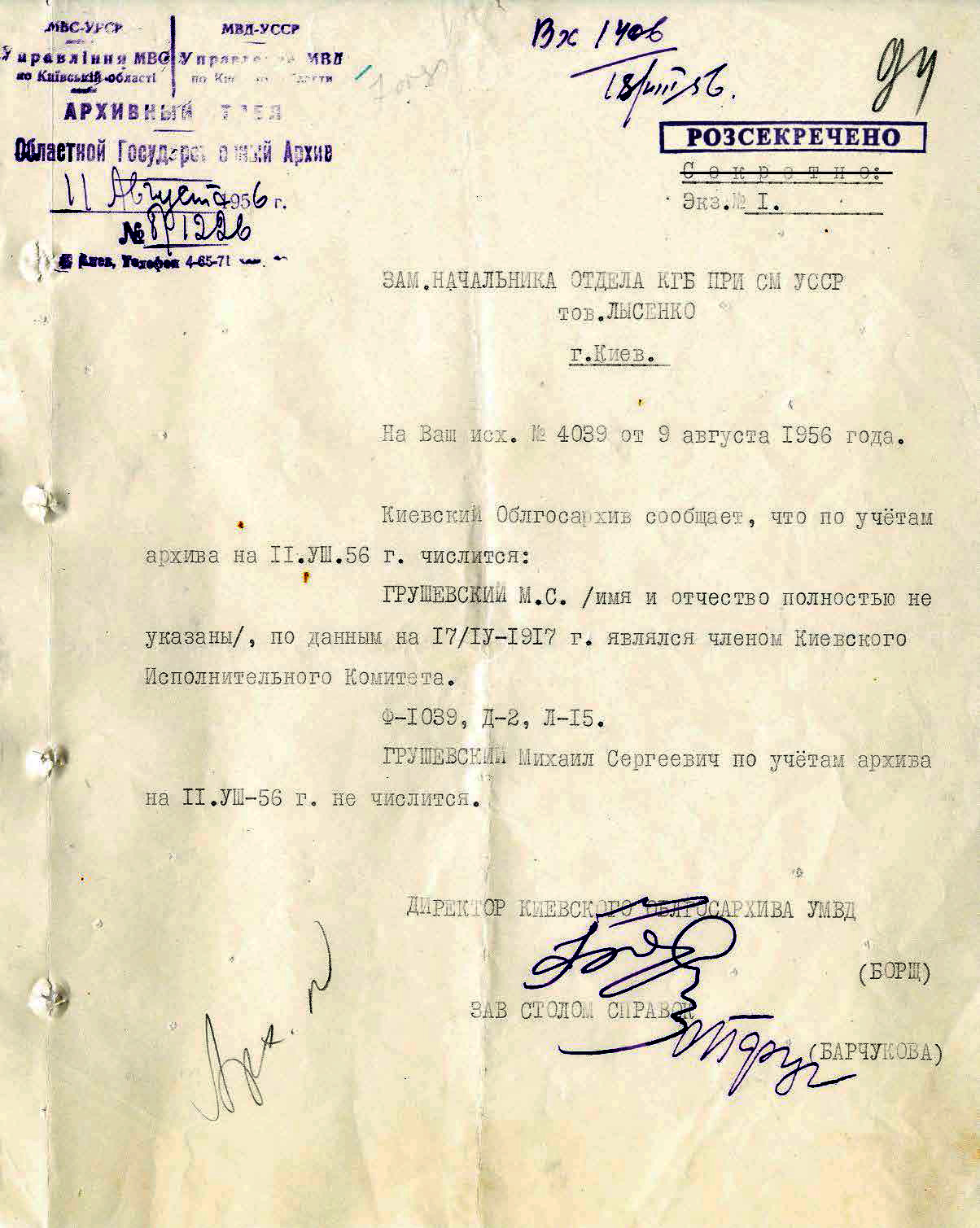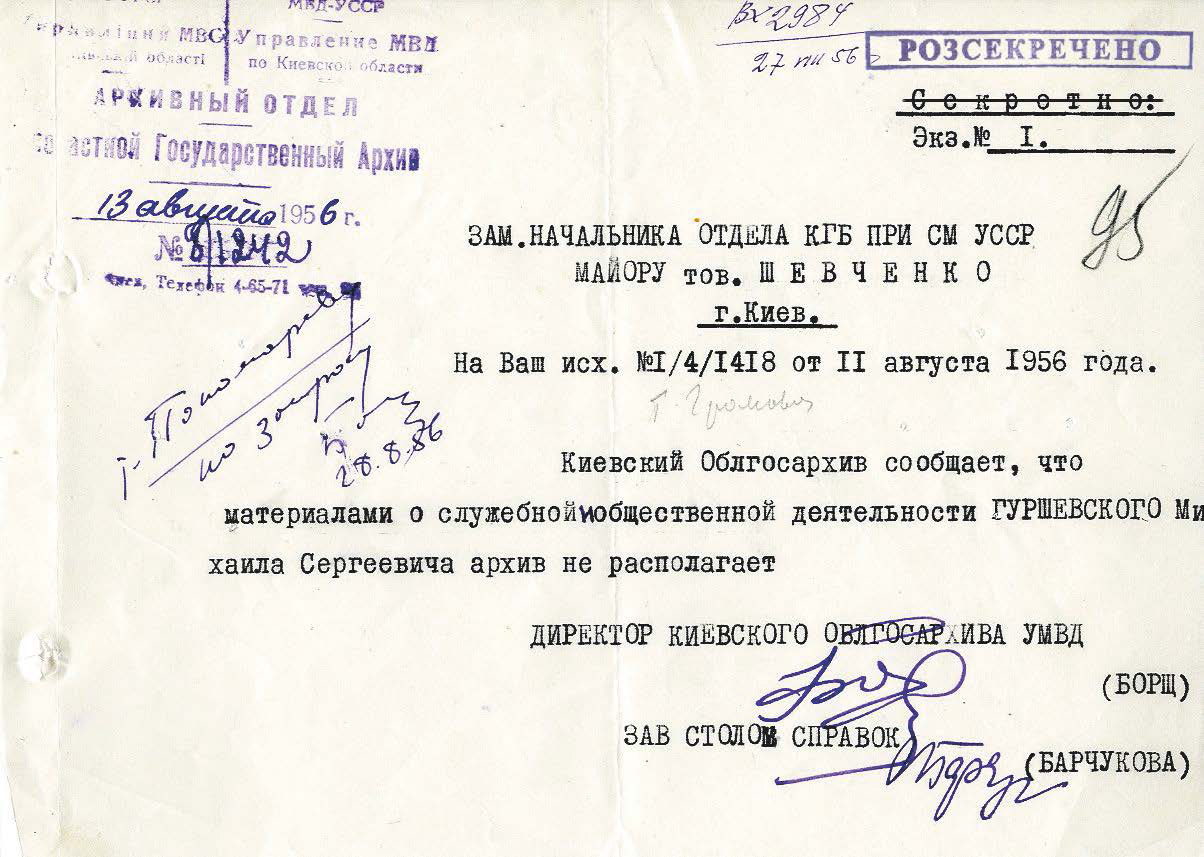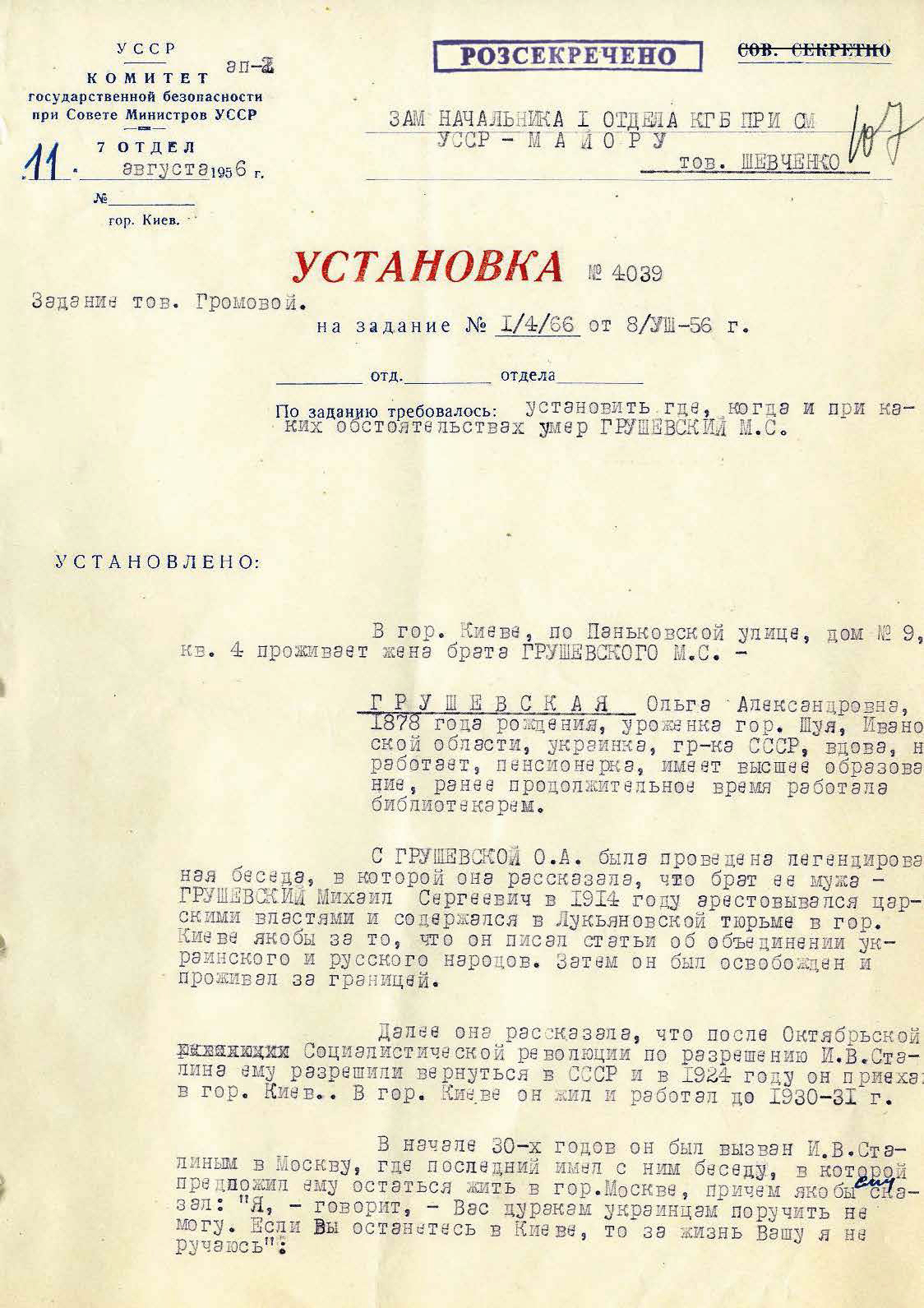The Mystery of Mykhailo Hrushevskyi’s Death. Unknown Revelations of a Doctor
11/24/2025
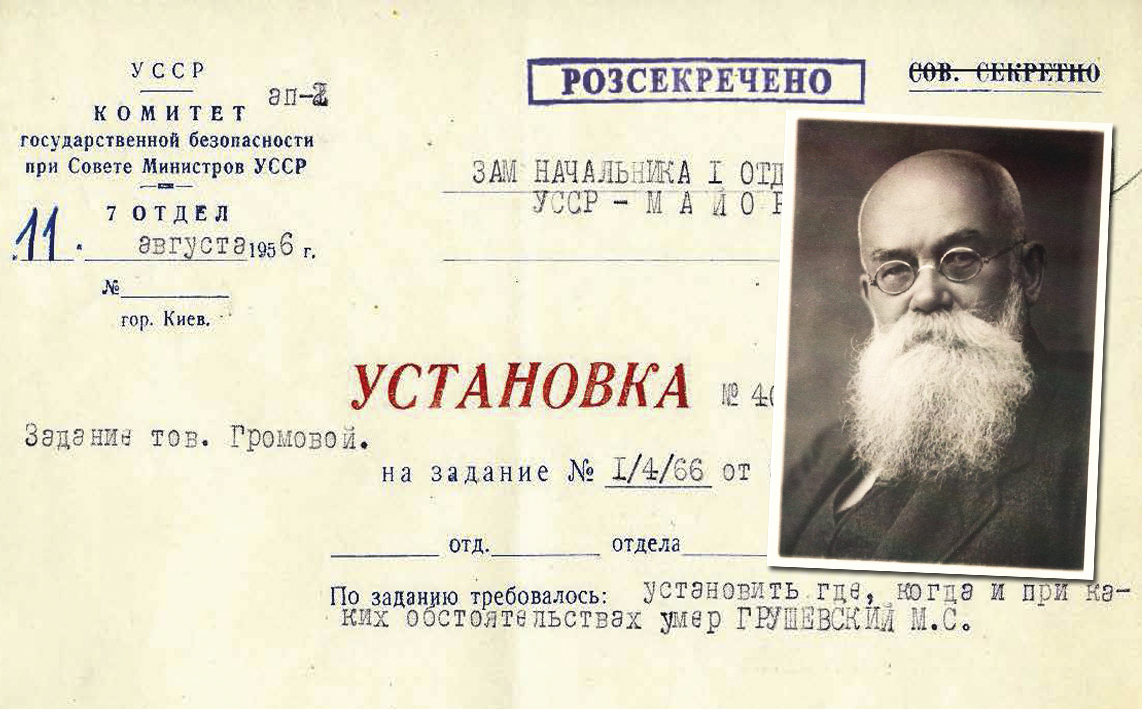
A number of documents relating to Mykhailo Hrushevskyi have been found in the archives of the Foreign Intelligence Service of Ukraine. The information contained in them shows the nkvd/kgb’s great operational interest in the figure of the head of the Ukrainian Central Rada throughout his life and even after his death. In particular, it is noted that the circumstances of the Academician’s mysterious death were re-examined more than 20 years after it occurred on November 24, 1934.
Some documents on Mykhailo Hrushevskyi are kept in the case file “Writer” on Volodymyr Vynnychenko. They are dated 1956. At that time, V. Vynnychenko and all the materials collected on him were again the focus of attention of the kgb. The kgb’s foreign agents had just obtained a copy of the unpublished “Testament to the Fighters for Liberation” by the former head of the Directory of the Ukrainian People’s Republic, who passed away on March 6, 1951. In it, he summarized his views on the struggle for Ukrainian statehood and appealed to future generations with a warning not to repeat the mistakes of the past, internal political confrontations, but to build a free Ukraine on truth, love, and moral foundations. At the same time, he was critical of contemporary figures such as S. Petliura, M. Hrushevskyi, P. Skoropadskyi, and others.
Having studied and analyzed the text, moscow sent to Kyiv specific instructions. It was pointed out that the “Testament” had an anti-soviet orientation, so it could not be published and distributed in its entirety. However, certain provisions were recommended for use in discrediting figures of the Ukrainian liberation movement and the very idea of Ukraine’s independence. Finally, a form of presentation and an informational pretext were found. Another letter from moscow stated that it should be a brochure entitled “Vynnychenko on Petliura”. It was recommended that it be written to the 30th anniversary of S. Petliura’s assassination, i.e., by May 25, 1956. And at the time when Ukrainian emigrants would be honoring the Chief Otaman of the Army of the Ukrainian People’s Republic and the second head of the Directory of the Ukrainian People’s Republic, the kgb would try to discredit him and diminish his role in Ukrainian history with the statements of the first head of the Directory, V. Vynnychenko. The same negative emphasis was to be made with regard to M. Hrushevskyi.
According to archival documents, the kgb of the Ukrainian ssr sent drafts of the brochure and other publications on this topic to moscow for approval. A controversy arose in the correspondence over the portrayal of M. Hrushevskyi. The curators from moscow criticized the authors of the text for some of the judgments. In particular, they pointed out the following:
“An impartial assessment of Hrushevskyi’s anti-soviet activities (the brochure states that Hrushevskiy... “was not entirely honest with soviet authorities...”) will give the OUN grounds to make him a “hero”, “martyr”, etc.
The authors of the brochure should be aware that Hrushevskyi was the ideologist of Ukrainian nationalism, the head of the Central Rada, and, in exile – the leader of the Socialist Revolutionary Party in Czechoslovakia. Having returned to Ukraine with “zminovikhivtsi” in the 1920s, Hrushevskyi led the largest anti-soviet conspiracy of that period (the so-called “Ukrainian National Center”). After its liquidation, he was sentenced to exile, where he died.
(FISU. – F. 1. Case 6760. – Vol. 1. – P. 138).
In response to this, the kgb of the Ukrainian ssr, among other things, pointed out that the statement about the conviction of M. Hrushevskyi and his death in exile was wrong. They claimed that in reality he had lived in moscow during the last years of his life and died in Kislovodsk while staying there at a resort.
But before refuting and disagreeing with some of the comments from the central authorities, which was rare in the kgb practice, Kyiv decided to study the available materials on M. Hrushevskyi and the circumstances of his death in more detail. Hence, in the case file “Writer”, archive No. 6760, a series of requests appeared to check him against existing operational and reference records.
One of the responses to the request stated that Mykhailo Serhiiovych Hrushevskyi, born in 1866, a native of Kholm, lived in Kyiv, was a Professor of History. He was listed in case file No. 1732 of the gpu of the Ukrainian ssr for the year 1924 with the label “Ukrainian nationalist”. The case is in the archives of the kgb of the Ukrainian ssr, No. 27031 (FISU. – F. 1. Case 6760. – Vol. 1. – P. 100). Another response stated that he was arrested by the gpu of the Ukrainian ssr under Article 54–6 of the Criminal Code of the Ukrainian ssr, the investigation case has no number, and there is no decision in the case, as he died during the investigation. The case is kept in the archives of the kgb of the Ukrainian ssr under No. 34404 (FISU. – F. 1. Case 6760. – Vol. 1. – P. 99).
Obviously, these inconsistencies, as well as corrections to the text of the brochures from moscow, forced the leadership of the kgb of the Ukrainian ssr to conduct a more in-depth study of M. Hrushevskyi’s biography and the circumstances of his arrest and death. As a result, a reference appeared in the case file from archival investigation case No. 34404 on M. Hrushevskyi, signed by Captain Hromova – an officer of the kgb of the Ukrainian ssr, who was also involved in the case against V. Vynnychenko.
The paper briefly outlined the Academician’s biography, including his emigration and return to Kyiv in 1924, his further leaving for moscow, and the circumstances of his arrest and investigation. It was mentioned that the case file contained handwritten testimony from M. Hrushevsky’s daughter Kateryna about her father’s arrest and his stay in moscow under the nkvd’s surveillance. The circumstances of his death were described as follows: “Hrushevskyi died in the second half of 1934, the location unknown. He was buried in Kyiv at the Baikove Cemetery” (FISU – F. 1. Case 6760. – Vol. 1. – P. 96–97). At the end of the report, information was provided about close relatives and the address of M. Hrushevskyi’s wife and daughter Kateryna at 9 Pankivska Street, Flat 4, Kyiv.
At the same time, in August 1956, requests were sent to the Central State Archives of the october revolution in Kharkiv, the Kyiv Regional State Archives, the Archives Directorate of the ministry of internal affairs of the Ukrainian ssr, and other agencies asking them to provide information “about the professional and public activities of former Academician and ideologist of nationalism Mykhailo Serhiiovych Hrushevsky, born in 1866, for the period 1931–1934, as well as the circumstances of his death.”
The responses stated that there was no information available for the specified period, nor any details about the circumstances of his death. The Central State Historical Archive sent a two-page paper about the Academician’s life and work, based on a publication in the newspaper “Komunist” on November 27, 1934. Apparently, it was an obituary, which, like other party publications, mistakenly reported the date of death as November 25, 1934 (not the 24) in Kislovodsk at the sanatorium of the All-Union Committee for the Promotion of Scientists, after a serious disease.
Then they tried to find out more through M. Hrushevskyi’s close relatives, who were mentioned in the document. By that time, his wife Maria Sylvestrivna was no longer alive, having died in 1948. His only daughter, Kateryna, was arrested by the nkvd in 1938 on trumped-up charges of participating in a counterrevolutionary nationalist organization. According to contemporary researchers, she was exiled to Kazakhstan, where she was allegedly shot in 1943 or died of a disease. Her sister Hanna is mentioned briefly in the archival materials, without any details. The chekists managed to find only Olha Hrushevska (maiden name Parfenenko) – the wife of Mykhailo’s brother Oleksandr.
Oleksandr Serhiiovych Hrushevskyi was a historian, researcher of Ukrainian history, literary scholar, ethnographer, archaeographer, journalist, and member of the Ukrainian Central Rada. In 1933, he was arrested as one of the leaders of an anti-soviet Ukrainian nationalist terrorist organization. On the basis of fabricated evidence, he was sentenced to five years of exile in 1939. He served his sentence in camps in Kazakhstan. According to scattered information, he died in 1942 or 1943.
His wife Olha was a historian, literary scholar, Shevchenko scholar, librarian, and public figure. After her husband’s death, she was constantly under the surveillance of the nkvd. She lived in Kyiv at 9 Pankivska Street, in a house that the Hrushevskyis family had purchased in 1908 with money left to them in an inheritance. It was at this address, in August 1956, that an operative of the 1st Department of the kgb under the council of ministers of the Ukrainian ssr, Captain Hromova visited apartment 4 with the task of “establishing where, when, and under what circumstances M. S. Hrushevskyi died”.
As noted in the document, a conversation was held with Olha Hrushevska, during which she provided general information about M. Hrushevskyi’s life and activities. In particular, about his arrest in 1914 by the tsarist authorities and his detention in Lukianivska Prison in Kyiv, his emigration, and his return to the ussr in 1924.
Some of Olha Hrushevska’s statements in the report are quoted verbatim. Obviously, they were given some special importance. Here is one of them: “In the early 1930s, he was summoned by j.v. stalin to moscow, where stalin had a conversation with him and offered him to stay in moscow, allegedly saying: “I cannot entrust you to stupid Ukrainians. If you stay in Kyiv, I cannot guarantee your safety”.
In fact, there is no direct evidence of M. Hrushevskyi’s personal meeting with stalin. At least, historians have no reliable evidence or documents which could confirm the fact of such a meeting. The only reference is to a letter he wrote to stalin while under arrest in 1931. In it, he sought to explain why he had initially confessed and then recanted. It is therefore unknown from whom Olha heard about the meeting with stalin and what could be behind it.
And then the document reveals the most interesting thing – the reason why that visit was planned in the first place. The report quotes Olha Hrushevska’s words: “After that, M. S. Hrushevskyi agreed and moved to moscow. In 1934, he traveled to a resort in Kislovodsk, where he died during medical treatment. His body was allowed to be transported for burial to Kyiv, where he was escorted by his doctor from Kislovodsk. The doctor (whose surname is unknown) informed M. S. Hrushevskyi’s relatives at the time that he had allegedly died a violent death, that someone from the government was interested in this, because he was the only one who contracted blood poisoning while taking a bath, and when they requested special medication from Moscow for his treatment, it was deliberately delayed and sent only on the second day after his death” (FISU. – F. 1. Case 6760. – Vol. 1. – P. 107–108).
There are no further resolutions, comments, or tasks in the case file based on the results of this operational measure called “establishment” (in russian – “ustanovka”).
The fact that M. Hrushevskyi’s body was escorted from Kislovodsk to Kyiv by a female doctor had never been mentioned before. The possibility of carbuncles appearing on his back after taking baths at the sanatorium (for example, accidental or deliberate infection with Staphylococcus aureus, which could have led to serious consequences) was not considered. At least, no such information could be found.
Various versions have been considered to date. In particular, there was a version about unqualified medical care, deliberate delay in treatment, or blood infection on the operating table at the behest of the nkvd. In other declassified and previously published documents from the kgb archives, researchers found special reports on various reactions to the death of M. Hrushevskyi. One of them mentioned that at the Institute of Chemical Technology of the All-Ukrainian Academy of Sciences, a group of researchers, discussing the first report in the press, tended to the conclusion that the Academician had indeed been poisoned.
The same documents stated that even before M. Hrushevskyi left for the resort, the local nkvd unit was informed by moscow of the need to closely monitor him, censor all his correspondence, and check the people who would come to meet him. It was reported that the chekists allegedly had intelligence information about his preparations to leave for abroad and that the trip to the resort could be used to meet with the organizers of the escape, and possibly to carry it out. Therefore, it was noted that preventing the escape was of exceptional political importance.
Therefore, the surveillance of M. Hrushevskyi along his route and directly at the sanatorium was obviously quite thorough. In particular, the research mentions that during his stay in Kislovodsk, he was followed by a nurse recruited by the nkvd under the code name “Voyna”. Were any operational measures planned to get information from him, exert psychological pressure, use special means to influence his health, or bring about his death? We can only guess.
New, previously unknown archival documents allow researchers to return once again to the topic of M. Hrushevskyi’s mysterious death and to place the necessary emphasis in this story.
